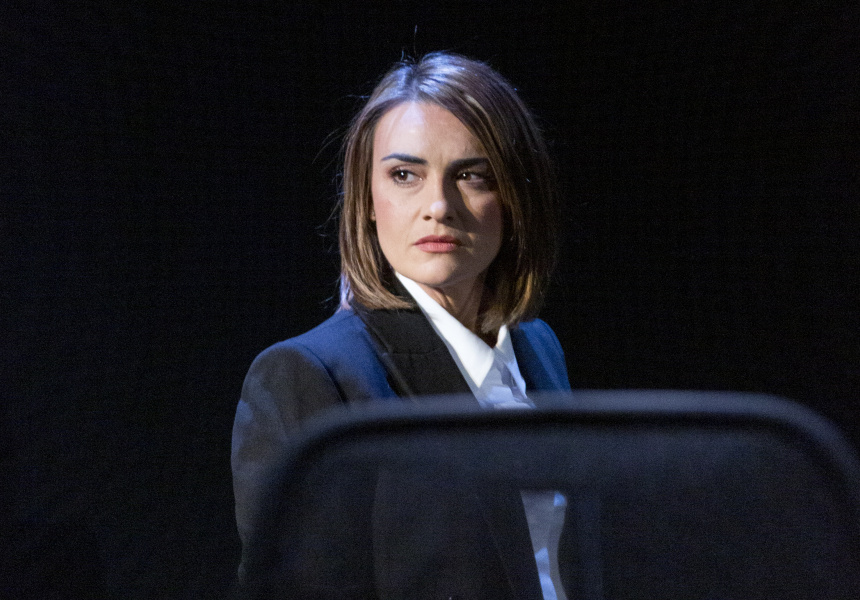When I speak with playwright Suzie Miller on the phone it’s the day after her play, Prima Facie, opened in Melbourne, and she’s packing. She’s about to fly to London for the Whats On Stage Awards – major British theatre awards voted for by the public. Prima Facie won Best New Play and Best Performer in a Play for its star, Killing Eve’s Jodie Comer, who performed in the show’s sold-out West End run.
Prima Facie is a one-woman play about a victim’s experience of sexual assault. It’s one of Australian theatre’s biggest recent successes, having first premiered in Sydney in 2019 before heading to the West End in 2022. After this season in Melbourne, it’ll go to Broadway in New York, where it will debut in April with Comer again in the lead.
Miller is originally from Melbourne and worked as a human rights and children’s rights lawyer before moving to London in 2010 to pursue a career in theatre writing. In the intervening years she’s become an award-winning playwright commissioned by companies in Australia, Canada, England, Scotland and Ireland, and splits her time between Sydney and London. In the wake of Prima Facie’s first run, it was called an overnight success. But as Miller sees it, it was actually many plays in the making.
Never miss a Melbourne moment. Make sure you're subscribed to our newsletter today.
SUBSCRIBE NOW“I wrote this play without a commission – I just wrote, because I could see this scenario, and there were very few playwrights with my background,” she says. “It’s not my first play by a long shot – I’ve [written] over 40 plays. So, it wasn’t this overnight thing.
“I’ve thought about these issues since I was very young, at law school, and all the way through being a lawyer. I couldn’t defend sexual assault cases because I thought, ‘I think the system’s a bit faulty.’”
The play is an intense monologue, running over 100 minutes with no break. It shines a light on a broken system that often doesn’t result in justice for victims.
Though it begins as a lighthearted and at times humorous look at the egos at work in the legal industry, the story takes a dark turn when defence lawyer Tessa (played in this Melbourne run by Sheridan Harbridge, who was also the first actor to play the role in 2019) experiences sexual assault. Suddenly Tessa is drawn into the legal world as it’s experienced by victims.
Twenty-three per cent of women and eight per cent of men in Australia are victims of sexual assault according to the Australian Bureau of Statistics.
“The awful part of it is that [sexual assault] is not remarkable,” says actor Harbridge, speaking to the prevalence of assault around the country. “And what happens to [Tessa] is murky – it’s no clear-cut, ‘this person is wrong’ … There’s a lot of forgotten memory, a lot of alcohol involved. And I think it’s because it’s a common story that it’s so interesting to people.”
Even after #MeToo and the introduction of Affirmative Consent Laws in Victoria and NSW, which include image-based sexual abuse, many believe that the adversarial criminal system is not fit for cases of rape and sexual assault because of the way victims are treated and forced to relive traumas. Recently, Liberal Party staffer Brittany Higgins, who was allegedly raped inside Parliament House by a colleague, was forced to withdraw from her own rape case due to “ongoing trauma” that presented “a significant and unacceptable risk to Higgins’s life.”
Miller says we also have a long way to go when it comes to educating men.
“Some of the rules around cross-examination of sexual assault victims have definitely changed. You know, you wouldn’t hold up someone’s G-string now and get away with it in court,” she says. “And that’s probably because we now have women judges, to be honest. But it’s not just a legal problem. The jury makes the decision and juries come from our community. So it’s actually about education.”
“When Griffin [Theatre, in Sydney] showed Prima Facie for the first preview night there were a whole lot of private school boys that came. And they all stood around afterwards to get their script autographed by the actor, and in their exuberance and excitement, having seen the play, they said, ‘God, I didn’t even know that was rape!’ I was like ‘Really? Wow, we have a problem … we have an education problem.’”
The play’s success is down to its fearlessness in addressing a problem that is so widespread, and still not talked about enough; not just sexual assault, but the criminal justice system victims are forced to endure. Prima Facie offers the victim’s point of view to the exclusion of all other narratives – a groundbreaking artistic assertion of the voices that are least heard, often not believed, and rarely vindicated with a conviction.
The MTC production of Prima Facie is showing at The Arts Centre until 25 March.



